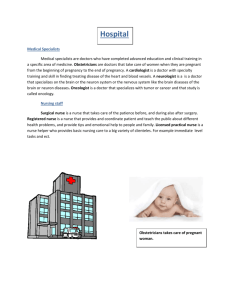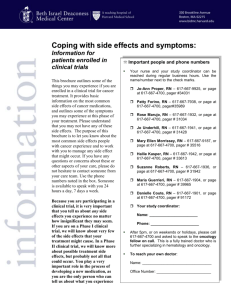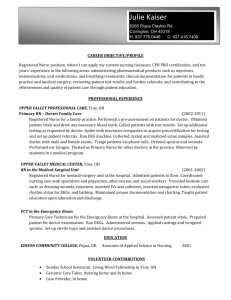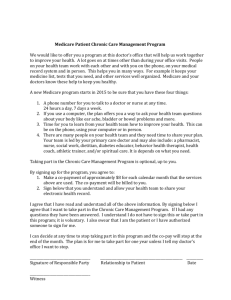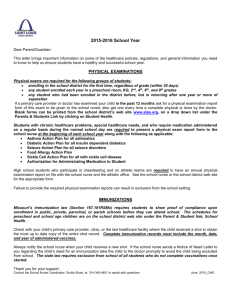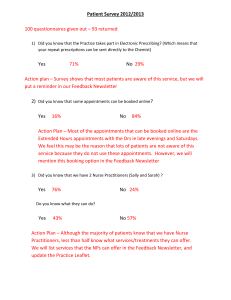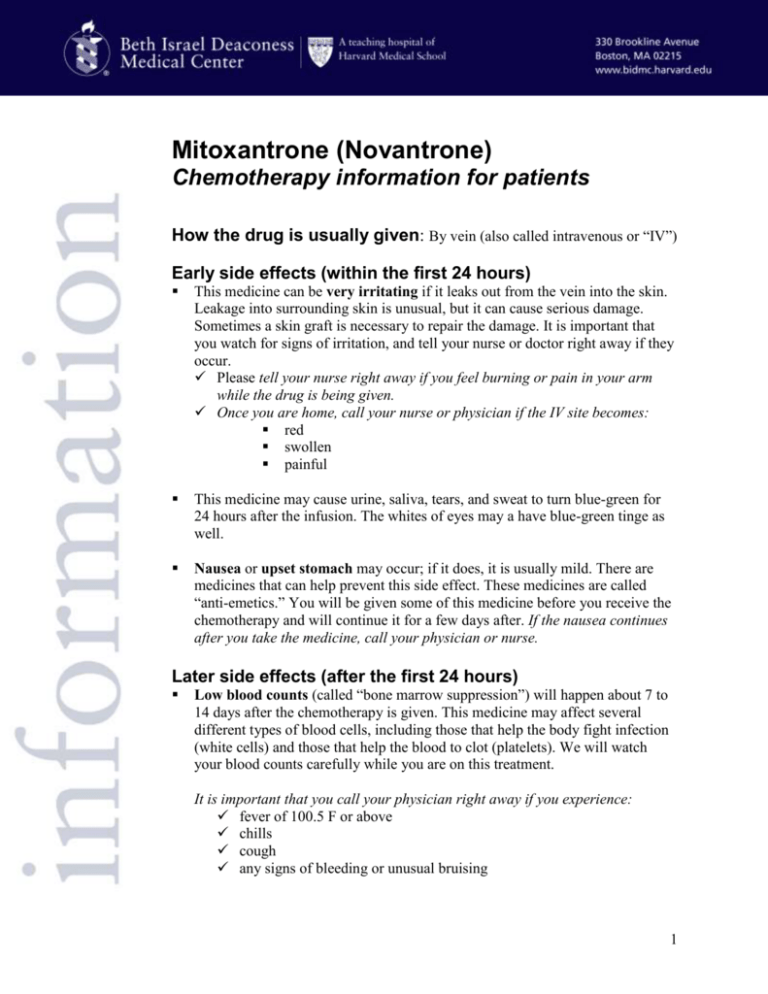
Mitoxantrone (Novantrone)
Chemotherapy information for patients
How the drug is usually given: By vein (also called intravenous or “IV”)
Early side effects (within the first 24 hours)
This medicine can be very irritating if it leaks out from the vein into the skin.
Leakage into surrounding skin is unusual, but it can cause serious damage.
Sometimes a skin graft is necessary to repair the damage. It is important that
you watch for signs of irritation, and tell your nurse or doctor right away if they
occur.
Please tell your nurse right away if you feel burning or pain in your arm
while the drug is being given.
Once you are home, call your nurse or physician if the IV site becomes:
red
swollen
painful
This medicine may cause urine, saliva, tears, and sweat to turn blue-green for
24 hours after the infusion. The whites of eyes may a have blue-green tinge as
well.
Nausea or upset stomach may occur; if it does, it is usually mild. There are
medicines that can help prevent this side effect. These medicines are called
“anti-emetics.” You will be given some of this medicine before you receive the
chemotherapy and will continue it for a few days after. If the nausea continues
after you take the medicine, call your physician or nurse.
Later side effects (after the first 24 hours)
Low blood counts (called “bone marrow suppression”) will happen about 7 to
14 days after the chemotherapy is given. This medicine may affect several
different types of blood cells, including those that help the body fight infection
(white cells) and those that help the blood to clot (platelets). We will watch
your blood counts carefully while you are on this treatment.
It is important that you call your physician right away if you experience:
fever of 100.5 F or above
chills
cough
any signs of bleeding or unusual bruising
1
Because of low blood counts, please do not have any dental procedures or
routine dental care without talking with your oncology doctor first. Also, please
do not insert anything into the rectum (enemas, suppositories, etc.) because of
the risk of infection in this area.
You may notice thinning of hair, but this is usually mild. Your hair will grow
back after your chemotherapy treatments are finished.
Fatigue is a common side effect of this medication. While you are undergoing
treatment, try to plan rest into each day. Don’t schedule strenuous activities for
these periods, and try to keep your schedule light. A small amount of regular,
light exercise may help you keep your energy up. But don’t push yourself if you
are too tired to exercise.
Mouth sores (mucositis) may develop.
Your mouth may feel dry or burn, and you
may see redness when you look in the
mirror. The mouth may feel sore and
painful. To speed up healing and help with
pain, use home-made mouth rinse (see box)
four to five times daily. For small sores, dab
the area with children’s “teething paste,”
which you can buy at the drug store.
If the pain continues and you cannot eat, or
you have more than three or four mouth
sores, call your physician or nurse.
Mouth care
You are prone to mouth sores
because of your treatment.
Please use a soft bristle toothbrush.
If you get mouth sores, dissolve
one teaspoon salt OR one
teaspoon baking soda in warm
water. Use this four to five times a
day to rinse or gargle.
Do not use store-bought
mouthwash.
Diarrhea (loose stools) can occur. The
diarrhea can be mild or severe. Even an increase in cramps may be a sign that
diarrhea will develop. Please let your doctor or nurse know if you have cramps
or diarrhea. They will recommend treatment, which may include:
drinking plenty of water
avoiding drinks with caffeine
avoiding dairy products, such as milk, cheese, and yogurt
taking medication to control symptoms, such as Kaopectate (available
at your drug store), or Imodium (prescribed by your doctor)
In rare cases, this medication may cause leukemia. This usually happens only
after it is taken for a long time. The leukemia may occur years after the
medication is stopped. This is a very unusual but serious side effect of this
medication.
2
In some cases this medicine can cause heart problems. Your doctor will do
tests on your heart to watch for this. If heart problems are detected, they can be
treated with medicines. Sometimes, permanent heart damage can occur.
Please let your doctor or nurse know if you notice any of these signs of heart
problems:
shortness of breath
chest pain or palpitations
ankle swelling
Ability to have children may be affected by this medicine.
For women of childbearing age:
Periods may become irregular or may stop permanently.
It IS possible to become pregnant, even if your periods have changed
or stopped. It is important that women receiving this medicine do
not become pregnant. Birth defects can occur. Please use birth control
if you are sexually active.
Talk to your doctor or nurse if you are concerned about having children
in the future.
For men:
Production of sperm may stop or decrease. It is also possible that the
cancer itself can affect sperm production, even without chemotherapy.
It is important that men receiving this medicine do not father a
child. Birth defects can occur. Please use birth control if you are
sexually active. It IS possible to cause pregnancy in your partner
while you are being treated.
Talk to your doctor or nurse if you are concerned about having children
in the future.
Please remember
Other side effects not listed here may occur. Please tell your nurse or physician if
you experience anything unusual.
Effects on other medicines
While you are under treatment for your cancer, please make sure your doctor
knows about all the medicines you are taking as there could be interactions. Let
your doctor know about prescription medicines, non-prescription medicines,
vitamins, herbs, and supplements.
Over
3
Call your doctor if…
Remember, please call your doctor or nurse if you notice any of the following. For
chest pain, trouble breathing, or any severe problem, call 911.
pain, redness, or swelling near where you got the IV
nausea or vomiting not relieved by medicine
fever of 100.5 or above, chills, or cough
any signs of bleeding
mouth sores that do not get better with home-made mouth rinse, or more than
three to four mouth sores
uncontrolled diarrhea
shortness of breath
chest pain
ankle swelling
any other symptom that concerns you
Important phone numbers
My doctor: ___________________________
If you are not a stem cell/bone marrow transplant patient:
Oncology clinic : 617-667-5167. You can use this number during regular
business hours. Ask to speak with your nurse.
o My nurse: ___________________
Beth Israel Deaconess page: 617-667-4700, ask for the medical
oncology fellow on-call. Use this number on nights (after 5pm),
weekends, and holidays.
If you are a stem cell/bone marrow transplant (BMT) patient:
BMT clinic : 617-667-3300. You can use this number during regular
business hours. Ask to speak with your nurse.
o My nurse: ________________
Beth Israel Deaconess page: 617-667-4700, ask for the bone marrow
transplant fellow on-call. Use this number on nights (after 5pm),
weekends, and holidays.
References
Wilkes G, Barton-Burke M. 2008 Oncology Nursing Drug Handbook. Jones and Bartlett Publishing,
Sudbury MA; pages 240-243.
www.uptodate.com
This material was prepared by clinicians from hematology/oncology and nursing at Beth Israel Deaconess Medical Center. It
is produced and distributed by the Beth Israel Deaconess Learning Center. ©2009, Beth Israel Deaconess Medical Center.
All rights reserved. MC1697 09/09
4


